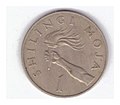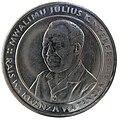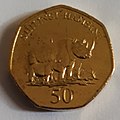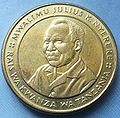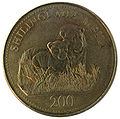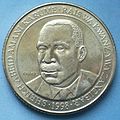Top Qs
Timeline
Chat
Perspective
Tanzanian shilling
Currency of Tanzania From Wikipedia, the free encyclopedia
Remove ads
The shilling (Swahili: shilingi; abbreviation: TSh; code: TZS) is the currency of Tanzania. It is subdivided into 100 cents (senti in Swahili). The Tanzanian shilling replaced the East African shilling on 14 June 1966 at par.[1]
Remove ads
Notation
Prices in the Tanzanian shilling are written in the form of x/y, where x is the amount above 1 shilling, while y is the amount in cents. An equals sign or hyphen represents zero amount. For example, 50 cents is written as "-/50" and 100 shillings as "100/=" or "100/-". Sometimes the abbreviation TSh is prefixed for distinction. If the amount is written using words as well as numerals, only the prefix is used (e.g. TSh 10 million).
This pattern was modelled on sterling's pre-decimal notation, in which amounts were written in some combination of pounds (£), shillings (s), and pence (d, for denarius). In that notation, amounts under a pound were notated only in shillings and pence.
Remove ads
Coins
Summarize
Perspective

In 1966, coins were introduced in denominations of -/5, -/10, -/20 and -/50 and 1/=, with the -/5 struck in bronze, the -/10 in nickel-brass (copper-nickel-zinc) and the -/50 and 1/= in cupro-nickel. Cupro-nickel 5/= coins were introduced in 1972, followed by scalloped, nickel-brass -/10 in 1977. This First Series coins set, in circulation from 1966 up to 1984, was designed by Christopher Ironside OBE.[2]
In 1987, nickel-plated steel replaced cupro-nickel in the -/50 and 1/=, and cupro-nickel 5/= and 10/= coins were introduced, with the 5/= decagonal in shape. In 1990, nickel-clad-steel 5/=, 10/= and 20/= were introduced, followed by brass-plated steel coins for 100/= in 1993, 50/= in 1996 and copper-nickel-zinc 200/= in 1998.
Coins currently in circulation are the 50/=, 100/=, 200/=, and 500/=. The 500/= coin was issued on 8 September 2014.[3]
Remove ads
Banknotes
Summarize
Perspective
On 14 June 1966, the Benki Kuu Ya Tanzania (Bank of Tanzania) introduced notes for 5/=, 10/=, 20/= and 100/=. The 5/= note was replaced by a coin in 1972. 50/= notes were introduced in 1985, followed by 200/= in 1986, 500/= in 1989 and 1,000/= in 1990. The 10/=, 20/=, 50/= and 100/= notes were replaced by coins in 1987, 1990, 1996 and 1994, respectively. 5,000/= and 10,000/= notes were introduced in 1995, followed by 2,000/= in 2003. A new series of notes came out in 2011. These new notes include many security features that prevent counterfeiting.[4][5]
Banknotes in circulation today are 500/=, 1,000/=, 2,000/=, 5,000/= and 10,000/=
Currently in circulation
Remove ads
See also
References
External links
Wikiwand - on
Seamless Wikipedia browsing. On steroids.
Remove ads









